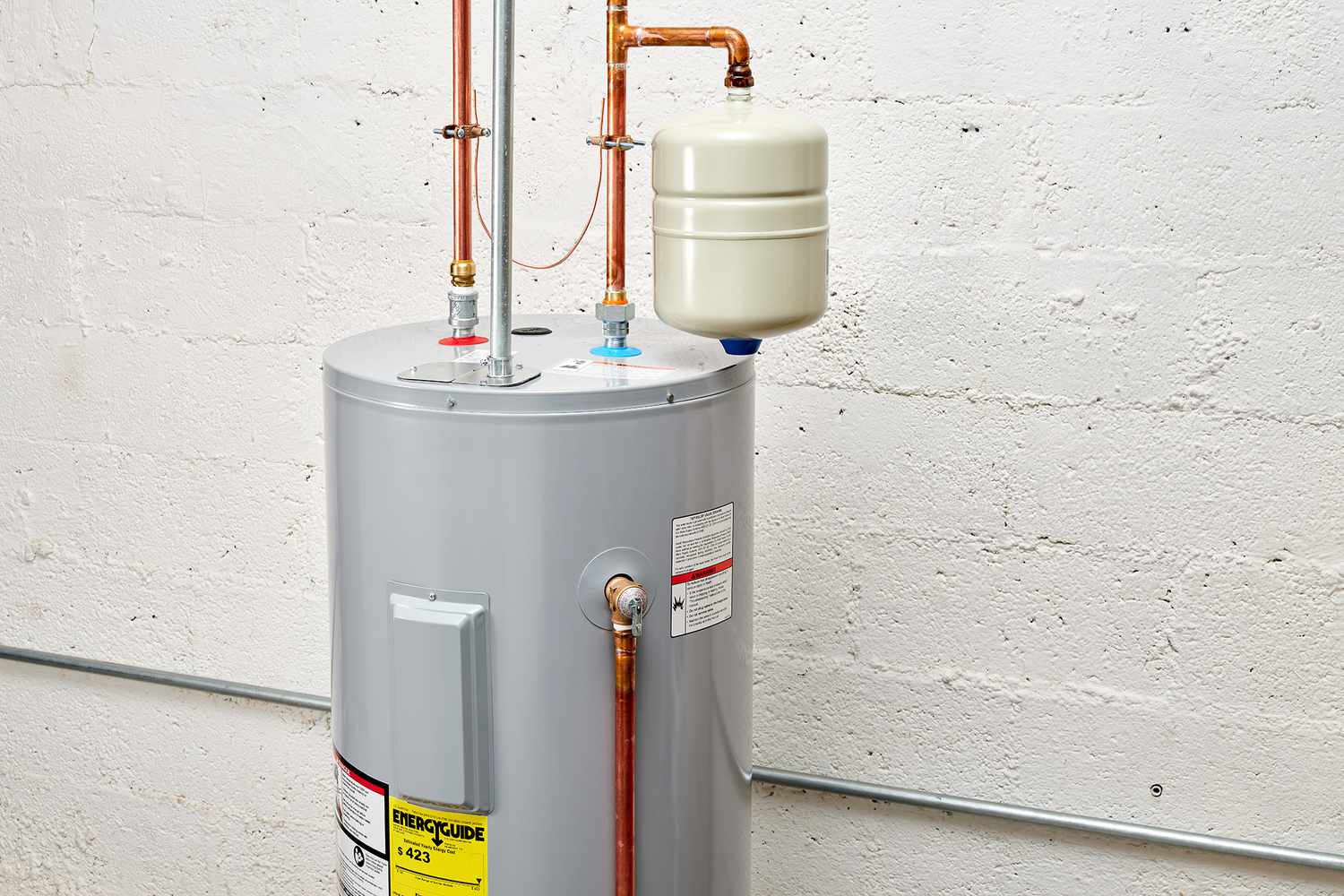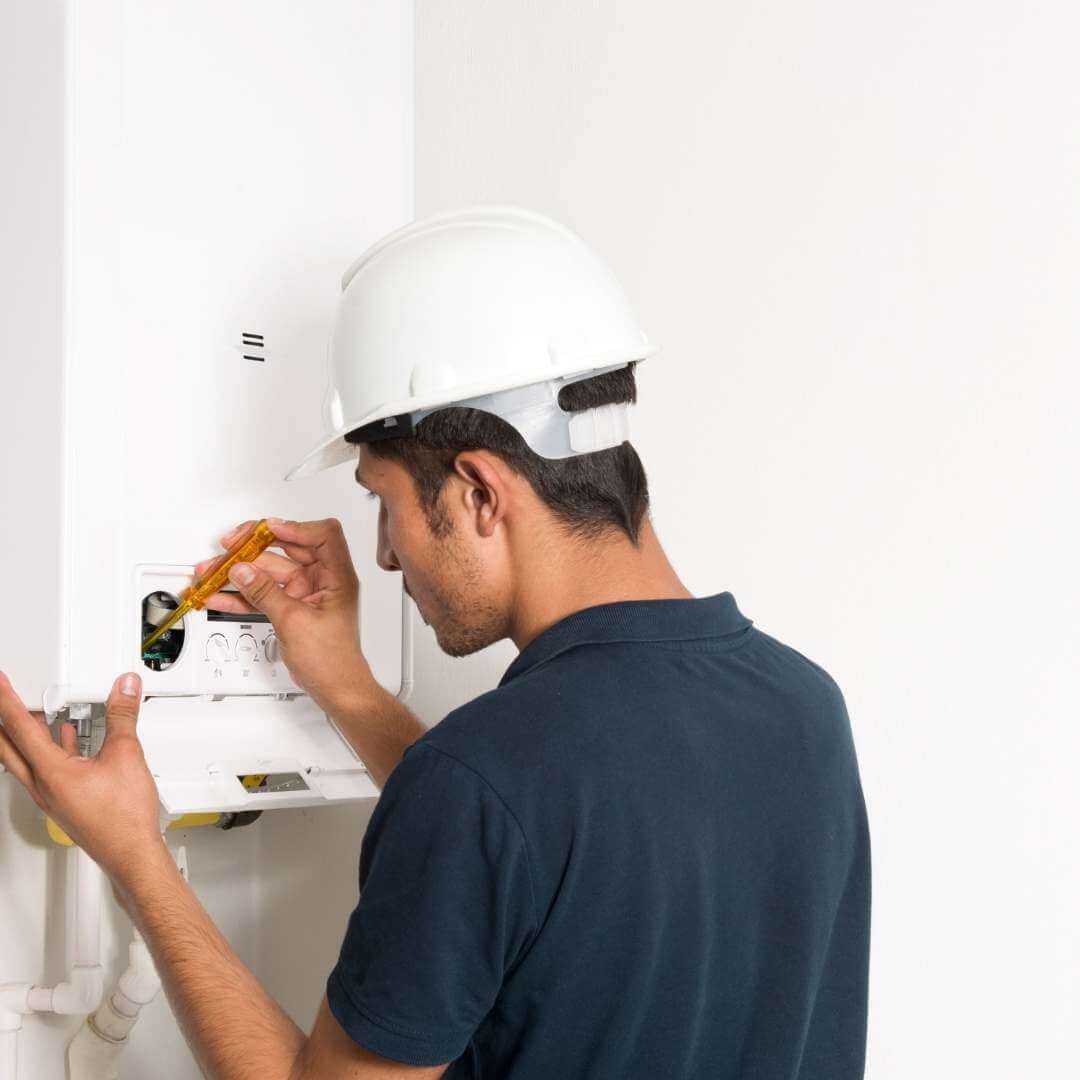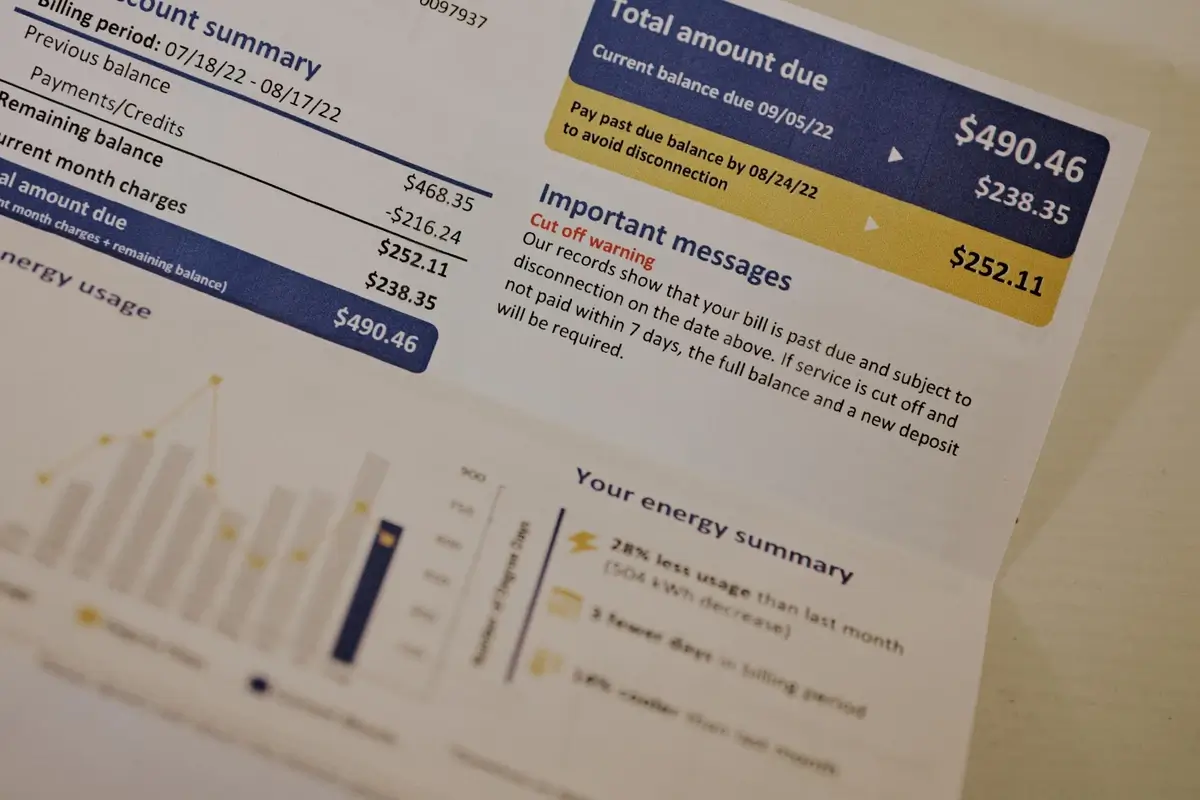Are you tired of weird sounds coming from your old gas water heater? Or maybe you are insecure about possible leaks that may happen? In that case, switching from gas to an electric water heater may seem like a good option.
Not only that, gas prices in the US will come at $3,72 on average in 2023. [1] This may be additional reasons for you to make a switch.
On the other hand, classic electric water heaters warm up water with electricity and store it in a storage tank until it’s needed. This means that you can use lower electricity rates to heat water inside your water heater tank.
Types of Water Heaters

1. Standard Storage Tank Water Heaters
Standard water heaters heat water using a gas flame or an electric heating element. Gas water heaters are often less costly to maintain than electric water heaters, depending on your community utility bills.
They’re also more expensive upfront than electric. However, gas heaters often pay for themselves in about a year based on energy savings.
Standard home tank water heaters range from 20 to 80 gallons and are less expensive than other water heaters.
Related: How Long Do Water Heaters Last
2. High-Efficiency Storage Tank Water Heaters
High-efficiency (HE) versions, as the name implies, are the most powerful storage tank water heaters available. Both gas and electric variants are available.
The US Department of Energy defines the energy factor (EF) rating on most gas-fired water heaters. The rating is aimed at helping consumers compare the efficiency of similar equipment. The appliance is more efficient if the EF number is higher.[2]
The EF of standard gas water heaters ranges from.50 to.60. The EF of non-Energy Star-certified HE water heaters is around.62. On the other hand, Energy Star-certified HE water heaters have an EF of.67 or higher. They utilize 10% to 20% less energy than their conventional counterparts. This can save you up to $140 per year and $2,900 throughout the tank’s lifetime.
What if you desire an electric with a high-efficiency rating?
A heat pump or hybrid water heater is one alternative. They’re the only electric water heaters that have received Energy Star certification.
However, they are more expensive than high-efficiency gas engines. They assimilate heat from surrounding air and transfer it to the water in the tank. As a result, they’re best suited to mild to hot temperatures.
They are more expensive than standard electric heaters. However, they can pay back in less than two years. A model with an Energy Star rating can save up to $3,000 over the life of the device by using up to 65 percent less electricity than a typical electric water heater.
Heat-pump water heaters require a lot of room, around 1,000 cubic feet of air space. They must also be placed in an area of your home where the temperature is consistently between 40 and 90 degrees so that they may draw on the warm surrounding air. Their average lifespan is eight to fifteen years.
Critical factors for selecting a water heater
Electricity and gas are the commonest fuel types for water heaters. Both have benefits and demerits to consider.
Size
Water tanks are measured in gallons. So, in general, the more water tank stores, the larger it will be. Electric and gas heaters are available in different. They are offered in 20 to 100 liter-sized capacity.
Electric heaters, on the other hand, can be utilized as point-of-origin heaters. The point-of-origin heater is small and can be deployed right at the tap. Moreover, it is efficient because it only heats water on demand.
An electric heater will take up significantly less space in your basement or laundry room. Because gas heaters must vent, they are larger and have pipes running from them, limiting their location. Because electric heaters are smaller, they give you more options for placement.
Fuel Source
When selecting a water heater, it is critical to consider the energy supply. Although not every home has a gas hookup, almost every home has electricity.
Therefore, with an electric heater, you can have hot water running continuously provided there is no interruption of power. However, if the gas line is not damaged, gas heaters may heat your water even with a power outage.
Heater capacity and rating
The first-hour rating, or how much hot water the tank can produce in the first hour of use, is another factor to consider (FHR).
FHR values vary between gas and electric tanks. A higher number indicates that more water will be available more rapidly. Conversely, gas heaters heat up faster than electric heaters; hence, the FHR on a gas heater is frequently higher.
Energy-Efficiency
Whereas gas water heaters are less expensive to operate due to reduced natural gas prices, electric water heaters are far more efficient.
This is as a result of the manner in which the heaters work. Exhaust gases from a gas heater must be vented, taking some of its heat. Electric heaters use almost all energy they receive to heat the water, resulting in reduced waste.
The high-efficiency gas heaters available for sale on the market utilize much less energy. Therefore, the Energy Star designation is given exclusively to this type of tank heater. Unfortunately, electric tank heaters with a high energy efficiency rating are unavailable.
Installation
Mounting a water heater is usually a simple procedure. First, an electric heater is piped and grounded when it is installed. Next, a gas heater is plumbed, the fuel supply is connected, and the vent is connected to an existing gas supply.
Switching from gas to an electric water heater or vice versa is challenging. First, the reservoir is plumbed like the others in a new gas heater system, but a gas line must be provided to the new position.
Then a vent must be made, which may necessitate cutting or boring into the home’s side. This can lengthen the installation process as well as increase the cost.
Gas vs Electric Heater Monthly Cost

Electric water heaters are less costly to purchase but more expensive to operate over time. Electric heaters feature fewer parts, resulting in a reduced initial cost. They are also easier to install, so that installation costs might be lower. However, the cost of electricity each month is more than natural gas.
So, while a gas heater may cost more upfront, it may pay for itself in lower energy expenses over time.
The operating cost for a gas or electric water heater monthly is influenced by how hot you require the water to be, the size of your home, the amount of water you consume, and the cost of energy or electricity in your area.
According to statistics, a gas water heater costs roughly $30 per month for the average home, whereas an electric heater costs around $42.
- Maintenance
Water heaters are pretty simple to maintain. Each heater should be flushed regularly to prevent silt from accumulating on the tank’s bottom and limiting its lifespan. If particles from the gas collect inside some gas tanks, the vent may need to be cleaned. All gas pipelines should be checked regularly to get rid of gas leaks.
- Safety Concerns
Gas lines in your home expose you to the risk of a gas leak and explosion. Similarly, you’re more likely to have carbon monoxide escapes in your home. The vent must be adequately maintained to avoid these problems, and the gas line must be checked regularly. These dangers are not present with electric water heaters.
Related: Hot Water Heater Smells Like Gas
- Environmental Concerns
Consider the environmental impact of each heating option if you’re concerned about the environment. Electric heaters are environmentally friendly because they are more energy-efficient. In addition, hydroelectric and solar are renewable power sources that can be used to run the heaters.
Natural gas, which must be obtained from the soil, is the only viable energy source for gas water heaters.
However, the extraction method can be highly wasteful and emit significant volumes of greenhouse gases. Gas heaters are also less efficient in general, making them less environmentally friendly.
How much does it cost to convert gas water heater to electric

Converting a gas water heater to an electric one is a difficult task. Although both heater types perform the same job, their plumbing connections, electrical connections, ventilation requirements, and installation techniques are different.
Electric water heaters cost between $300 and $700, while gas water heaters cost between $400 and $800. Electric heaters cost $700 to $1,000 to install, whereas gas heaters cost $1,000 to $2,000, based on whether you already have a gas line and vent. A 40-gallon electric water heater will cost between $1000 and $1,700, while a gas water heater will cost $1,400 and $2,800 [4].
A simple gas to electric water heater conversion kit exists that switches RV hot water containers to electric without affecting the tank’s gas supply. This implies that you can use a gas hot water tank until you reach an electrical outlet and switch it over if you have a gas hot water tank.
Then, if the gas service isn’t working, you can disconnect the gas line and utilize the electric service instead. In addition, because most campgrounds include electricity charges in their rates, running the hot water tank on their electricity is substantially less expensive.
Related: Gas vs Electric Water Heaters
Switching From Gas to Electric Water Heater
Among the most common reasons homeowners switch from an electric to a natural gas water heater is to save energy bills. Gas is generally less expensive than electricity monthly.
Gas water heaters may also replace hot water more quickly, which might be beneficial if you have a large family. On the other hand, switching to gas can be more costly upfront, particularly if a new fuel line and ventilation system are required.
Although it can be feasible switching from a gas to electric water heater; however, it is less common. Since electric water heaters have fewer internal components, they have longer lifespans than gas water heaters.
They are also great if space is a concern in your house.
The electric circuit will almost certainly need to be changed to suit the new appliance during installation. The old water heater’s gas line will also need to be turned off by a professional. However, the initial costs of setting up an electric heater are typically lower than those of a gas water heater.
How to save money on a gas or electric water heating bill

Although you may enjoy the convenience of running your hot shower whenever you want, you might not appreciate receiving a high-energy bill. This is why you need to be aware of pros and cons of electric water heaters. Fortunately, you can take action to guarantee that your energy costs are kept to a minimum.
- Do your laundry using cold water.
Using cold water for laundry loads with a gas water heater can save you $67 per year, and an electric water heater can save you $161 per year. Given that most current detergents don’t require hot water to work, this is a simple approach to reduce your monthly power expense.
- Ensure you set 1200F as water heater temperature on the thermostat.
For every 10 degrees Fahrenheit you lower your water temperature, you save 3 to 5% on your monthly energy bills. To avoid injury from scalding hot water, families with young children should set the thermostat to 1200F.
- Avoid Taking Baths That Aren’t Necessary.
One bathtub filled with water is roughly similar to two individuals bathing simultaneously. This requires a considerable amount of energy to heat than a shower.
- Purchase low-flow shower fixtures.
Investing in low-flow bathroom fixtures is another option to reduce your monthly electricity expenditure. For example, low-flow shower fixtures lessen the quantity of hot water used and save from 25 to 60% on energy bills.
- Turn Off Water When You’re Not Using It
Leaving the water on while brushing your teeth or shampooing your hair increases over time. During these brief periods, try shutting off your water. Turn off the water while shampooing or the faucet while cleaning your teeth.
Related: No Pressure in Shower But Plenty Everywhere Else
Bottom Line
Switching from a gas to an electric water heater may be more expensive in terms of money and time. The accompanying fixtures will need to be replaced for the system to function correctly.
Read Also: Rinnai Water Heater With No Hot Water

Michael Davis is a heating & plumbing expert who currently works as independent contractor in SC. He also writes for Plumbertip.
For almost 10 years he worked on various plumbing tasks across South Carolina.


